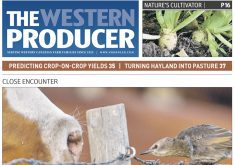For the next year, this column will mark The Western Producer’s 100th anniversary by taking a deep dive every week into a past issue of the paper.
Supply management coverage continues to use up a lot of ink at The Western Producer, so it was interesting to watch in the Feb. 18, 1971, issue as the marketing system began to take form.
The House of Commons agriculture committee was holding hearings into Bill C-176, which would eventually become law and create the National Farm Products Marketing Council, or as it’s known today, the Farm Products Council of Canada.
Read Also

Kochia has become a significant problem for Prairie farmers
As you travel through southern Saskatchewan and Alberta, particularly in areas challenged by dry growing conditions, the magnitude of the kochia problem is easy to see.
It’s this agency that authorized the establishment of national marketing agencies for farm products, setting the stage for what we now think of supply management.
It was not an easy birth, based on the stories in this issue.
Manitoba agriculture minister Sam Uskiw told MPs that the bill threatened his province’s farmers unless it was amended.
He said Manitoba favoured a system of orderly marketing of farm products and that it was “prepared to co-operate with other provinces and national marketing agencies to promote an orderly sharing of national markets in the interest of agricultural producers across Canada.”
However, he said the bill ignored interprovincial trade in the farm products that didn’t have a national marketing council and failed to address access to markets and farm market sharing agreements.
United Grain Growers president A.M. Runciman said his company supported the principal of national marketing councils and agencies but only with advisory powers.
The Saskatchewan Stock Growers Association was even more direct, repeating its opposition to “any type of compulsory marketing boards for the sale or control of livestock and livestock products.”
While the fierce debate showed that in some ways our industry’s political discourse hasn’t changed much from 1971 to 2024, there was also a reminder in this edition of the differences over the last 53 years.
A two-page spread was dedicated to CBC and CTV’s television programming for the upcoming week for Winnipeg, Saskatoon, Yorkton, Sask., Red Deer, Calgary, Regina-Moose Jaw, Prince Albert, Sask., Medicine Hat, Lethbridge, Swift Current, Sask., Edmonton, Brandon, Lloydminster and Dawson Creek, B.C.
How quaint.

















